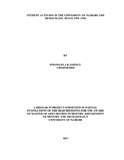| dc.description.abstract | This project paper is an in-depth study on student activism and democratic space in
the University of Nairobi between 1970 and 1992. It examines the relationship of
students, in their activism, to the University administration and the state. It also looks
at the tactics the students used in their activism. The objectives of this study were to
explain the causes of student activism in the University of Nairobi between 1970 and
1992, the impact of the students' activism and the chalJenges that were faced by
students in their activism. Generational revolt theory and Marxist theory were used in
the study. These theories were useful in assessing the various dimensions that
confrontations would take between students, on one hand, and the government and the
University administration on the other. The study was conducted using secondary
sources and primary sources which mainly involved fieldwork and library research.
The study argues that student activism in the University of Nairobi was caused and
heightened by the opening and closing of democratic space within and outside the
University. Different events between 1970 and 1992 which caused closures or
expansions of democratic space were discussed in the study and were used to validate
this argument.
The study also revealed that the students, in their activism, influenced sections of the
Kenyan public to weigh in on political discourses. The church, trade unions and a
number of politicians weighed in on discourses concerning issues the students had
raised in their protests or issues that the student demonstrations resulted to. In doing
so, the students played a conscientising role by influencing Kenya's social fabric.
Challenges that student activists faced are also examined in this study, which are
argued to have influenced the tactics that the students employed in their activism. The
study further argues that student activism of the 1960's was generally concerned with
issues particular to the University but became increasingly involved with Kenya's
national politics with the murder of lM Kariuki in 1975. The students' relationship
with President Daniel Arap Moi is also examined in the study and is explained to be
an additional factor in making national politics a major concern of their activism
between 1978 and 1992. The study further argues that student activism was
instrumental in expanding the national democratic space in the early 1990s by taking
part in the cIamour for multipartyism. | |

